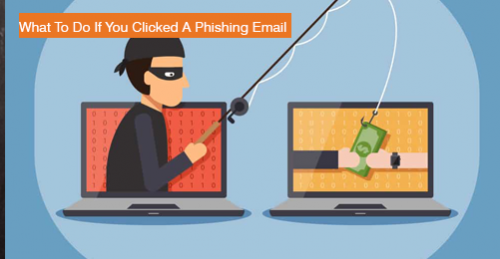

2019/12/08 IT & Cyber-Security Solutions 2292 visit(s)


So, you are stressed in work and in your "multitask mode", waiting for emails and upcoming tasks, archiving your inbox...etc., then suddenly a specific subject catches your attention. You open that email ignoring this faint voice in your head telling you not to. Everything looks legitimate. It contains brands' logos, same language each brand uses when promoting. It is an email from a brand that you are super interested in, so you click a link in this personalized email only to have that faint voice screaming "DANGER!", but it's too late, you have been tricked into clicking on a phishing link.
So, what's next? Should you close the office and head home with depression? OR should you ignore it and continue your work? After all you're not the first nor the last who clicked on a phishing email. Of course, neither of these options works well for you. Today we’re giving you 7 tips to follow after or if you’ve clicked on a phishing email:
You really need to remain calm. Panicking will cause "emotional clicking" which would properly spread the virus faster and you don't want that to happen.
By shutting down your internet connection or unplugging the ethernet cable connected to your router, you will reduce the risk of a malware infection to spread over your network. You will also prevent the malware from stealing your sensitive information by keeping cyber-criminals out of your device.
Now that you are disconnected to the outside world, you should start taking backups for all your work. If you take backups periodically, then your task has just become easier, just take backups for your recently edited or created files to a hard drive, thumb drive or a simple DVD. If not, then backup everything using one of the aforementioned methods. Once you’ve finished, presume to tip #4.
Perform a full system scan using your own anti-virus program. Let the tool takes its time, it might take longer than usual but - trust me – it’s worth every second. Once finished, have another test with another tool just to confirm safety. Take notice that some alarms might pop-up on your screen, so don't panic! It's just the anti-virus tool doing its job.
The main purpose of phishing emails is harvesting personal information such as usernames, passwords, credit card numbers, bank details and other sensitive information. If you suspect you've become a phishing attack victim, you should change all your credentials using an un-infected device. Also, don’t make the mistake of using the same password for multiple accounts. Use two factor authentications as an extra defense layer.
Once you finish all the previous tips, you’d better follow your company's policy for cyber-attacks. Also make any necessary calls whether to the banks you deal with or to the government. Also, make sure your OS and anti-malware are always up to date.
"Fool me once shame on you, fool me twice…"
Always keep in mind that legitimate organizations will never ask for personal or sensitive information via emails. If the message is truly important, then they will contact via more secure methods such as telephones. However, if you want to live in peace of mind you can download or try the tools that protect against phishing attacks.
To fortify your frontline defenses against any potential cyberattacks, try our Cisco Cloud Email Security today, or contact our experts to help you with any question you may have.